There seems to be lots of examples on implementing Repository pattern for Linq to SQL. Most of them featuring IRepository and DI; Some have implemented Unit of Work and some not. I tried to read as most of the results returned by searches on SO and Google on Linq to SQL repository patterns. Nevertheless I've not come across a complete solution yet.
From my readings I've implemented a repository pattern as shown below:

(source: baburajpb at sites.google.com)
I'm using DI to register interfaces on which the repositories are depended:
this.container.RegisterType<IConnectionStringFactory, ConnectionStringFactory>(new ContainerControlledLifetimeManager(),
new InjectionConstructor(connectionString));
this.container.RegisterType<IDataContextFactory, DataContextFactory>();
Implementation of Repository pattern:
public interface IPrivilegeRepository : IRepository<PrivilegesEntity>
{
IList<MenuModel> GetRootMenu();
IList<MenuModel> GetChildMenu(int parentId);
}
public class PrivilegeRepository : Repository<PrivilegesEntity>, IPrivilegeRepository
{
#region IPrivilegeRepository Members
public IList<MenuModel> GetRootMenu()
{
return FindAll(menu => menu.ParentId == null)
.OrderBy(menu => menu.SortOrder)
.Select(c => EntityMapper.Privileges.ToBusinessObject(c))
.ToList();
}
public IList<MenuModel> GetChildMenu(int parentId)
{
return FindAll(menu => menu.ParentId == parentId)
.OrderBy(menu => menu.SortOrder)
.Select(menu => EntityMapper.Privileges.ToBusinessObject(menu))
.ToList();
}
#endregion
public PrivilegeRepository(IDataContextFactory dataContextFactory)
: base(dataContextFactory)
{
}
}
IRepository generic interface:
public interface IRepository<T> where T : class
{
IEnumerable<T> All();
IEnumerable<T> FindAll(Expression<Func<T, bool>> exp);
T Single(Expression<Func<T, bool>> exp);
T First(Expression<Func<T, bool>> exp);
}
Repository class is implemented as below with implementations of IRepository (not shown) and is having a dependency on IDataContextFactory which DI is taking care of:
public class Repository<T> : IRepository<T> where T : class
{
public Repository(IDataContextFactory dataContextFactory)
{
this.dataContextFactory = dataContextFactory;
}
}
Repositories are consumed using IoC:
PrivilegeRepository repository = container.Resolve<PrivilegeRepository>();
I'm returning result of queries as a collection of Business Object in order to avoid dependency on Linq to SQL on application layers where I consume repository. The above scenario works fine with my WPF application which is using MVVM pattern. I have ViewModel aks Presenter classes which are not depended of classes generated by Linq-SQL.
How do I extend this pattern so that I can save data to the Database. I'd like to pass Business Objects back to the repository and get them saved. Is it possible? How can I implement Unit of Work in such a scenario.